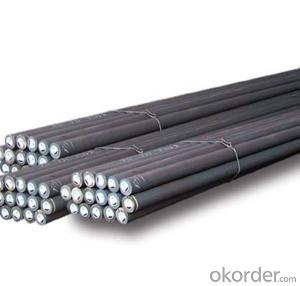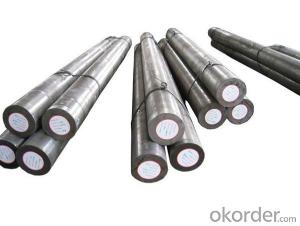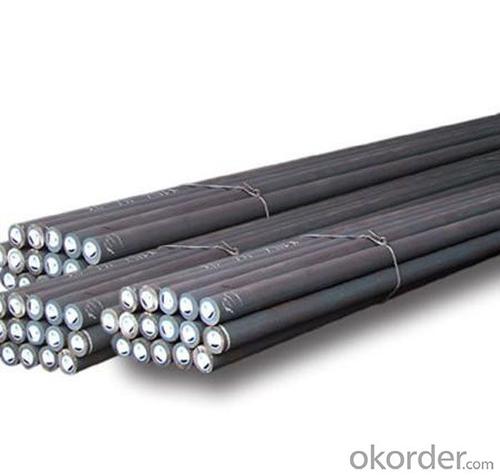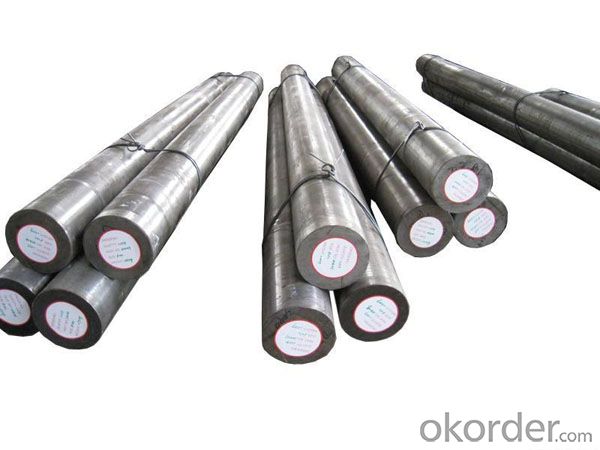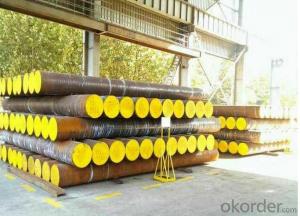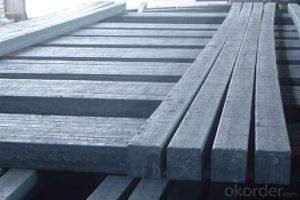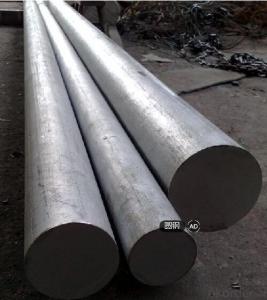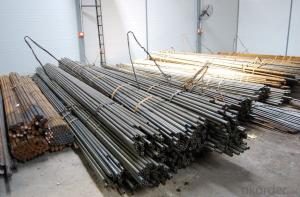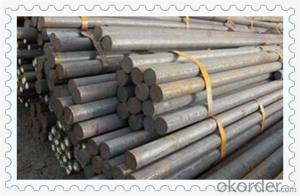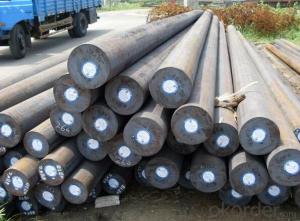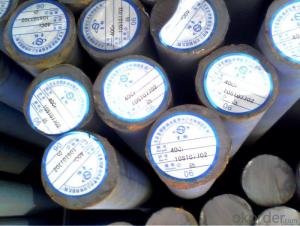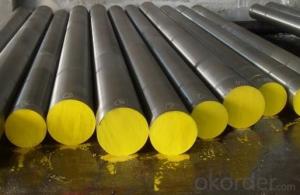Special Steel1.2344 Die Steel Bar Round Bars
- Loading Port:
- China main port
- Payment Terms:
- TT OR LC
- Min Order Qty:
- 30 m.t.
- Supply Capability:
- 10000 m.t./month
OKorder Service Pledge
OKorder Financial Service
You Might Also Like
Specification
Chemical Composition%
| Country | Standard | C | Si | Mn | Cr | Mo | V | S | P |
| China(GB) | 4Cr5NoSiV1 | 0.32-0.45 | 0.80-1.20 | 0.20-0.50 | 4.75-5.50 | 1.10-1.75 | 0.80-1.20 | ≤0.030 | ≤0.030 |
| USA(ASTM) | H13 | 0.32-0.45 | 0.80-1.20 | 0.20-0.50 | 4.75-5.50 | 1.10-1.75 | 0.80-1.20 | ≤0.030 | ≤0.030 |
| Germany(DIN) | 1.2344 | 0.37-0.42 | 0.90-1.20 | 0.30-0.50 | 4.80-5.50 | 1.20-1.50 | 0.90-1.10 | ≤0.030 | ≤0.030 |
| Japan(JIS) | SKD61 | 0.37-0.42 | 0.90-1.20 | ≤0.50 | 4.50-5.50 | 1.00-1.50 | 0.80-1.20 | ≤0.030 | ≤0.030 |
Available Size
Rolled round bar:φ12-80mm × L
Forged round bar:φ85-600mm × L
Applications: Suitable for aluminum and copper die-casting moulds working for long time at elevated temperatures,hot extrusion dies,core rod forging dies,plastic moulds,etc,also suitable for heat resistance thimbles,push rods and ejector sleeves
Main Product
Plastic Mould Steel
DIN 1.2311,1.2738,1.2083,1.2316 etc.
AISI P20,P20+Ni,420 etc.
JIS SUS420J2
Hot Work Steel
DIN 1.2344,1.2343,1.2367,1.2365,1.2581,1.2713 etc.
AISI H13,H11,H10,H21, etc.
JIS SKD61,SKD6,SKD5,SKT4 etc.
Cold Work Steel
DIN 1.2739, 1.2601, 1.2080, 1.2436, 1.2631, 1.263, 1.2510, 1.2327 etc.
AISI D2, D5, D3, D6, A8, A2, O1 etc.
JIS SKD10, SKD11, SKD1, SKS3 etc.
High Speed Steel
DIN 1.3343, 1.3243, 1.3247, 1.3355 etc.
AISI M2, M35, M42, T1 etc.
JIS SKH51, SKH35, SKH59, SKH2 etc.
Alloy Structural Steel
DIN 1.7035,1.6511,1.7220,1.7225 etc.
AISI 5140, 4340, 4135, 4140 etc.
JIS SCr440,SNCM439,SCM435,SCM440 etc.
Stainless & Carbon Steel or Others
DIN 1.4125,1.1191 etc
AISI 440C,1045, 1020 etc.
JIS SUS440C,S45C etc
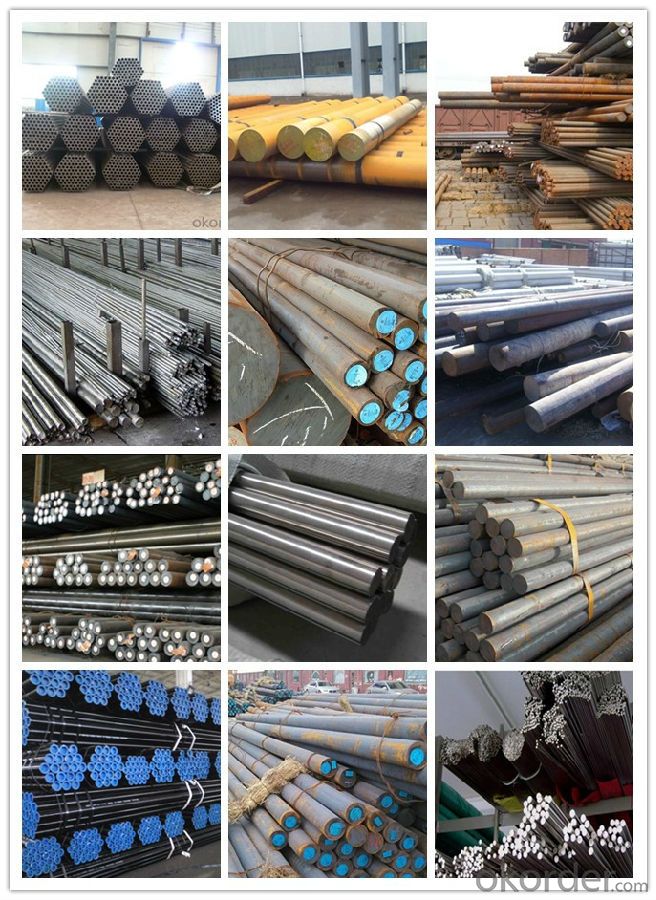 Product show
Product show
Workshop show
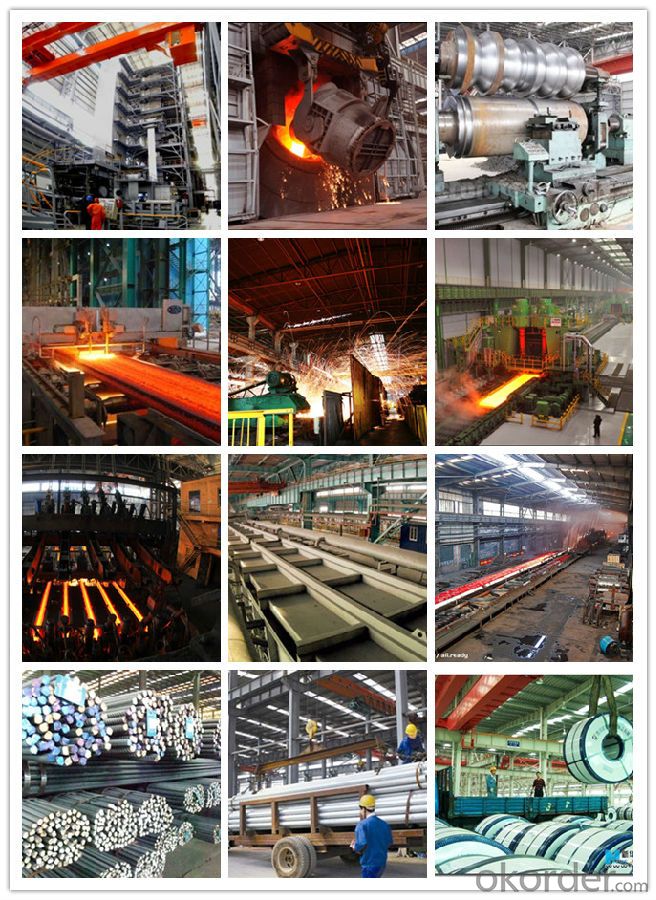
Shipping
1. FedEx/DHL/UPS/TNT for samples, Door-to-Door;
2. By Air or by Sea for batch goods, for FCL; Airport/ Port receiving;
3. Customers specifying freight forwarders or negotiable shipping methods!
Delivery Time: 3-7 days for samples; 5-25 days for batch goods.
Payment Terms
1.Payment: T/T, L/C, Western Union, MoneyGram,PayPal; 30% deposits; 70% balance before delivery.
2.MOQ: 1pcs
3.Warranty : 3 years
4.Package Informations: 1) EXPORT, In 20 feet (GW 25 ton) or 40 feet Container (GW 25 ton)
2)as customer's requirement
Why choose us?
(1) The leading exporter in China special steel industry.
(2) Large stocks for various sizes, fast delivery date.
(3) Good business relationship with China famous factories.
(4) More than 7 years steel exporting experience.
(5) Good after-sales service guarantee.
- Q: How is special steel used in the defense manufacturing process?
- Special steel is commonly used in the defense manufacturing process due to its exceptional strength, durability, and resistance to extreme conditions. It is utilized in the production of various defense equipment and components such as armored vehicles, submarines, aircraft carriers, and ballistic missiles. Special steel is crucial for enhancing the overall performance, reliability, and safety of these defense systems, making it an essential material in the defense manufacturing industry.
- Q: How does special steel contribute to the wear resistance of products?
- Special steel contributes to the wear resistance of products in several ways. Firstly, special steel is known for its high strength and hardness, which allows it to withstand heavy loads and resist deformation. This property is crucial in applications where products are subjected to abrasive forces or repetitive stress, such as in machinery parts or cutting tools. Additionally, special steel often contains specific alloying elements that enhance its wear resistance. For example, the addition of chromium can form a protective layer of chromium oxide on the surface of the steel, which acts as a barrier against corrosion and wear. Similarly, the addition of vanadium or molybdenum can increase the steel's hardness and toughness, making it more resistant to wear and fatigue. Moreover, special steel can be heat-treated to further enhance its wear resistance. Through processes like quenching and tempering, the steel's microstructure can be modified to achieve a fine-grained and homogeneous structure. This results in improved hardness and increased resistance to wear, as well as better dimensional stability. In summary, special steel contributes to the wear resistance of products due to its inherent strength and hardness, alloying elements that enhance wear resistance, and the ability to be heat-treated for improved properties. These characteristics make special steel an excellent choice for applications where durability and longevity are crucial.
- Q: Can special steel be used in marine environments?
- Indeed, marine environments can benefit from the utilization of special steel. Specifically engineered to endure the harsh conditions prevalent in marine settings, special steel, such as stainless steel or marine-grade steel, proves its worth. These environments typically expose materials to saltwater, which possesses a highly corrosive nature. Nonetheless, special steel's resistance to corrosion remains intact due to its elevated levels of chromium and other alloying elements. Consequently, it becomes exceedingly suitable for an array of marine applications, encompassing shipbuilding, offshore structures, and marine equipment. The reliability of special steel lies in its exceptional strength, durability, and corrosion resistance. Moreover, to further augment its resistance to corrosion, special steel can undergo additional treatment and coating, thereby guaranteeing its longevity and optimal performance in marine conditions.
- Q: What are the main characteristics of electrical steel?
- The main characteristics of electrical steel include high magnetic permeability, low electrical resistivity, and low hysteresis loss. It is specifically designed to efficiently conduct and transform electrical energy, making it ideal for use in transformers, motors, and generators.
- Q: What are the requirements for special steel used in high-pressure applications?
- The requirements for special steel used in high-pressure applications typically include high strength, excellent resistance to corrosion and oxidation, good weldability, and the ability to withstand extreme temperatures and pressures without deformation or failure. Additionally, the steel should have a high level of toughness to withstand impact and fatigue loads, as well as good dimensional stability to ensure proper sealing and performance in high-pressure environments.
- Q: How does corrosion-resistant steel protect against chemical attacks?
- Corrosion-resistant steel protects against chemical attacks by forming a protective layer on its surface, which acts as a barrier between the steel and the corrosive substances. This layer, typically composed of chromium oxide, is highly stable and prevents the steel from direct contact with chemicals, thus reducing the likelihood of corrosion.
- Q: What are the different renewable energy grades of special steel?
- There are several grades of special steel that are commonly used in the renewable energy industry. These grades are specifically designed to withstand the harsh conditions and requirements of renewable energy applications. One of the most common grades of special steel used in renewable energy is stainless steel. Stainless steel is known for its corrosion resistance properties, which make it ideal for offshore wind turbines or solar panel frames that are exposed to moisture and saltwater. It is also used in geothermal power plants, where high temperatures and corrosive environments are present. Another grade of special steel used in renewable energy is high-strength low-alloy (HSLA) steel. HSLA steel has a higher strength-to-weight ratio, making it suitable for applications that require lightweight structures with high strength, such as wind turbine towers or support structures for solar panels. Furthermore, there is advanced high-strength steel (AHSS) that is commonly used in the automotive industry but can also be utilized in renewable energy applications. AHSS offers excellent strength, durability, and impact resistance, making it suitable for components like blades or gears in wind turbines. Additionally, there is a grade of steel called weathering steel, which is often used in renewable energy applications that are exposed to outdoor elements. Weathering steel forms a protective layer of rust, which prevents further corrosion and eliminates the need for additional coatings. It is commonly used in solar panel support structures, transmission towers, or other outdoor equipment. Overall, the selection of the appropriate grade of special steel for a specific renewable energy application depends on factors such as the type of renewable energy source, the environment in which it will be installed, and the specific requirements of the project.
- Q: What are the requirements for special steel used in nuclear power plants?
- The requirements for special steel used in nuclear power plants include high strength and durability to withstand extreme temperatures and pressure, excellent corrosion resistance to prevent degradation, low levels of impurities to minimize radiation damage, and strict adherence to quality control and testing procedures to ensure safety and reliability.
- Q: How does special steel contribute to the defense sector?
- The defense sector relies heavily on special steel, which offers numerous benefits and applications that bolster national security. First and foremost, special steel is renowned for its exceptional strength, durability, and resistance to wear and corrosion. These attributes make it an ideal material for manufacturing military equipment and weapons. Tanks, armored vehicles, naval ships, and aircraft carriers all benefit from the structural integrity and protection against enemy attacks provided by special steel. Furthermore, the use of special steel in ballistic armor and bulletproof vests enhances the safety of soldiers on the battlefield. Additionally, special steel alloys possess remarkable thermal resistance and high-temperature capabilities, making them suitable for producing jet engines, turbines, and rocket components. These materials can withstand extreme conditions, enabling faster and more efficient military aircraft, missiles, and vehicles used in space exploration. Moreover, special steel's electromagnetic properties make it invaluable in the defense sector. It is employed in developing radar systems, communication devices, and electronic warfare equipment. Special steel alloys effectively shield against electromagnetic interference, ensuring secure and reliable communication during critical defense operations. Furthermore, special steel plays a vital role in the production of precision tools and machinery used in the defense sector. With its high machinability, special steel enables the fabrication of complex components with tight tolerances. Military-grade cutting tools, drills, and machine parts are manufactured using special steel, thereby enhancing the efficiency and effectiveness of military operations. In conclusion, special steel significantly contributes to the defense sector by providing crucial properties such as strength, durability, resistance, and more. Its applications in military equipment, weaponry, armored vehicles, aircraft, and electronic systems not only enhance national security but also protect soldiers and enable advanced defense capabilities.
- Q: What properties make special steel unique?
- Special steel, also known as alloy steel, possesses unique properties that set it apart from other types of steel. Firstly, special steel is distinguished by its exceptional strength and hardness. It is engineered to have a high resistance to deformation, making it suitable for applications that require robust materials. Whether in construction, automotive, or aerospace industries, special steel provides the necessary durability and reliability. Another remarkable property of special steel is its superior corrosion resistance. By incorporating certain alloying elements such as chromium, nickel, or molybdenum, this type of steel becomes highly resistant to rust and other forms of corrosion. As a result, special steel is often used in marine environments, chemical plants, and oil and gas industries where exposure to harsh conditions is prevalent. Furthermore, special steel demonstrates excellent heat resistance. It can withstand high temperatures without losing its strength or structure, making it suitable for applications in extreme heat environments, such as power generation or furnace components. This property allows special steel to be utilized in critical situations where other materials may fail or degrade. Special steel is also known for its versatility and adaptability. With various alloying elements and heat treatment processes, it can be tailored to meet specific requirements of different industries. This flexibility makes it possible to create specialized alloys with unique properties, such as improved machinability, wear resistance, or enhanced magnetic properties, catering to a wide range of applications. In conclusion, the properties that make special steel unique are its exceptional strength and hardness, superior corrosion resistance, excellent heat resistance, and its versatility in being tailored to specific requirements. These properties make special steel an invaluable material in numerous industries, enabling the development of innovative and reliable products.
Send your message to us
Special Steel1.2344 Die Steel Bar Round Bars
- Loading Port:
- China main port
- Payment Terms:
- TT OR LC
- Min Order Qty:
- 30 m.t.
- Supply Capability:
- 10000 m.t./month
OKorder Service Pledge
OKorder Financial Service
Similar products
Hot products
Hot Searches
Related keywords
